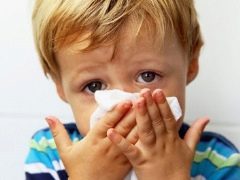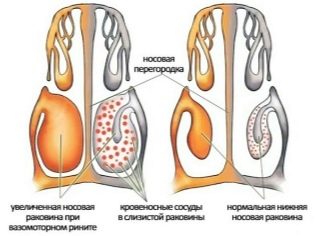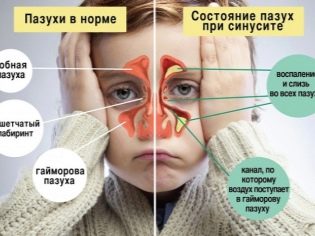Psychosomatics of rhinitis and nose problems in children and adults
Free breathing is the key to well-being. At the same time, a runny nose can interfere with a person's normal sleep, a headache appears, his body may experience oxygen starvation if nasal breathing is difficult. Not always, unfortunately, adults attach due importance to the common cold. But in vain, because very often the appearance of such an unpleasant symptom can be an important life prompt.
It is worth considering the psychosomatic causes of nose problems, how to treat a child and an adult.
general information
The nose is an organ that performs very important functions. He not only decorates our face, but also provides our breath. Before the air enters the lungs, it must be sufficiently warmed, humidified, and disinfected. In all this, our nose takes the most active part. It provides the normal temperature of the air, the next in the lungs, plays the role of a filter, because it is in the nose that dust and microbes settle - they are picked up by mucous membranes and villi.
If it were not for the nose, we said it was not at all the way it is now, because it acts as a resonator, which gives voice to sonority, timbre.
With the help of the nose, or rather, receptors located in it, a person can get important information for existence - about smells. Without smelling, a person could hardly survive in the ancient world, because smells are important information. for the hunter. Today, without smell, there would be no tastes, perfumery and culinary delights, because all the food seemed about the same.
Nose diseases are widespread in adults and children.
Speaking about them from a psychosomatic point of view, we will cover several of the most common pathologies.
- Rhinitis (runny nose) - This is an inflammation of the nasal mucosa. It is caused by microbes, viruses, and may be due to allergies. Rhinitis is often a symptom of other diseases. With the same frequency, it happens in adults and children. It is especially difficult to treat vasomotor rhinitis and chronic rhinitis.
- Epitaxis (nosebleeds) more common in children than in adults. It can be rare or chronic. Sometimes bleeding occurs outside (anterior epitaxis), and sometimes through the esophagus into the stomach (posterior epitaxis).
- Sinusitis - This is an inflammatory process in the sinuses. It is most often a complication of rhinitis. This group of diseases includes antritis, ethmoiditis, sphenoiditis, frontal sinusitis.
Among the common complaints include injuries of the nose, curvature of the nasal septum. The child is often found foreign bodies in the nose, as well as the nose can be burned or froze, in the nose may appear polyps, abscess or furuncle.
Almost for all problems with the nose, the person's sense of smell decreases or disappears, there is a feeling of nasal congestion, nasal mucus discharge (sometimes with pus, blood), there are complaints of fatigue, headache.
A person with a runny nose is rarely cheerful and contented - usually a violation of nasal breathing leads to depression, bad mood, lethargy.
Psychosomatic causes
Psychosomatic medicine considers any pathology or symptom in terms of the relationship of mental state and physiological changes. The nervous system and the human psyche control all processes, including the mechanisms of disease development.
Special attention to explanations on psychosomatics should be paid to adults and children, who often suffer from a cold. Often, doctors do not find objective reasons for symptoms on the part of the nose and talk about hypothermia or possible inhalation of dusty air. But In all cases where there is no compelling reason for nasal congestion, but a runny nose - first of all, psychosomatic causes of rhinitis should be considered.
The psychosomatic significance of the nose is very similar to its physiological purpose: we need this organ in order to breathe air (life), take it from the outside world, transform (warm it, clean it) and pass it on to the lungs. The nose, again, is needed to exhale, that is, to give off the carbon dioxide that has accumulated in the body.From a psychosomatic point of view, problems with the nose - a violation of the exchange of information with the outside world. Nasal congestion and the inability to feel smells is only a detail (a person ceases to receive information about smells from the world), which indicates contact disturbance.
If snot is flowing, a person gives more than he takes from the world, which again confirms the violation of interaction.
People who often have a stuffy nose are not set up for full contact with the outside world. They are either afraid to live as they want, as they dream, or they are wary of the world, waiting for a dirty trick and everywhere see a threat to their security. Psychoanalysts have noticed that “nuances” of the world (smells) are alien to them - they try to avoid both troubles and great joy.
Ideally, in the opinion of a person with a chronic runny nose, one must live “exactly”, without suffering and dizzying takeoffs. A person with nasal breathing problems occasionally gives birth to bold feelings and emotions, ideas to conquer mountains, swim across the sea, take, finally, and slam the door in the face of a bored boss at work, but they drive such thoughts away. Dense ideas, tightly driven into the subconscious, are transformed over time into the very invisible barrier that causes swelling of the nasal passages and respiratory failure.
Neuro-linguists have long noticed that people who have suffered for years from a cold, arising regularly or not at all, not giving in to any treatment, routinely use such traces in their speech as: “this smells foul”, “I like I can not stand (something or someone), "" do not breathe in my direction. "
- If the emotional background of a person is relatively even, based on the suppression of his emotions, the desire to live quietly, quietly and “exactly”, but usually develops chronic rhinitis.
- If irritation is present in the gamut of emotions (“I can't stand the breath”), then develop inflammatory diseases of the nose.
- If a person experiences anger towards the outside world, towards people or a particular person who, in his opinion, prevents him from living “exactly”, a purulent illness develops, for example, antritis, frontal sinusitis, abscess, furunculosis.
- A person who grossly violated the laws of the world and refused to accept positive and important information, to breathe life with a full breast where it was necessary, may be faced with sudden injury to the nose. For example, a person persistently refuses to help sick children, denying their suffering - when denial reaches a peak, he can fall on unclean steps in the stairwell and break his nose or meet hooligans and get a traumatic blow on the face.
- A person who does not know how to rejoice, tries to spoil the joy of others, can also suddenly get nose injury, and in this there will be nothing strange: trauma is a warning that it is time to change your outlook, to give an opportunity for joy and grief to calmly enter, process and leave.
- If contact with the world cannot be established, development is possible. chronic severe illnesswhich generally block the ability to breathe through the nose, to smell.
Why the baby does not breathe through the nose?
In childhood, a runny nose often occurs, and at certain periods of life that are decisive for a child. I went to the kindergarten - a runny nose, went to the first class - laid the nose, on the nose important competitions - a runny nose, the family moved to a new place of residence - rhinitis.
Psychologists say that adaptive abilities in children are lower than in adults, therefore nasal congestion in childhood without any additional symptoms (bleeding, snot, cough, fever, etc.) often indicates that the child has some difficulties with adaptation to new conditions, new team, new rules.
Any discomfort in relation to the new environmental conditions of the world can cause nasal congestion.
Most children outgrow this psychosomatic stuffiness by the age of 15–16., but for some it persists for life.
As soon as a person comes out of the habitual to the new, the unusual, he will have a runny nose. For example, he came on vacation to a new climate, returned from vacation to work (especially from a long, for example, maternity), changed his place of work, his residence - the nose gets stuck immediately. Such rhinitis passes independently, in process of adaptation. If it is delayed, the reason should be sought in something else.
In children, a prolonged runny nose, not associated with adaptation, usually occurs as a protective mechanism against someone who prevents them from perceiving life easily and naturally.. It happens in families where parents are used to dramatizing and complicating everything. They instill in children that life is a very complicated thing, that it is impossible to achieve anything without work, that a walk is impossible until the lessons are done. Parenting perfectionists and pedants deprive the child of the sensation of joy from communicating with the world.
If the child is forbidden to cry (which is quite common), then the child may develop sinusitis, in psychosomatics they consider it a disease of squeezed and restrained tears.
Psychologists pay attention to another pattern - in families, where children rarely see their parents, do not play with them, do not spend the weekend together, where there is a lack of love and attention, problems with the nose, children suffer more often than in families where the parents have time for the child. There is another parental extreme, hypertext.
If the grandmother and mother do not allow the baby to "breathe", control every step, every action, then a cold will act as an additional protection against them.
Treatment
Vasoconstrictive drops, inhalation can only bring a temporary effect, without painstaking work on a nose disease is almost impossible to eliminate. An adult needs to ask himself what exactly is preventing him from breathing and living as he likes, what is bothering him. The answer may be very unexpected, but it will be the key to recovery. Found the reason you need to heartily thank, let go. If you do everything sincerely, then runny nose will not return.
The child must be shown to the pediatrician. Even if after reading this article you understand the real reasons for his illness, it is important that the baby be examined by the doctor. Psychological assistance to the child in this case will speed up the process of traditional treatment. and will be an excellent prevention of the return of the disease.
It is important not to limit yourself in your aspirations - to live as you wish, and not as much as someone, even a very authoritative and respected person, demands of you. Only people open to the world never experience problems with the nose.


















